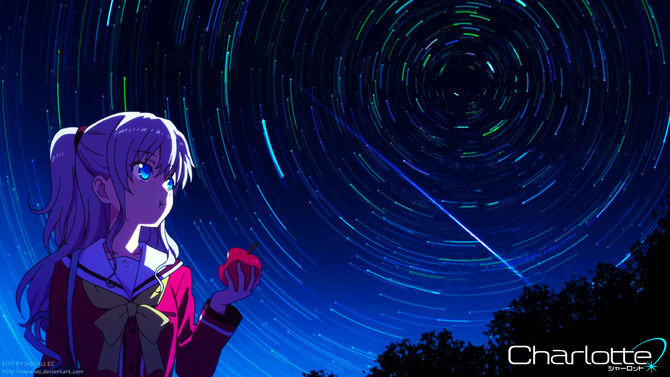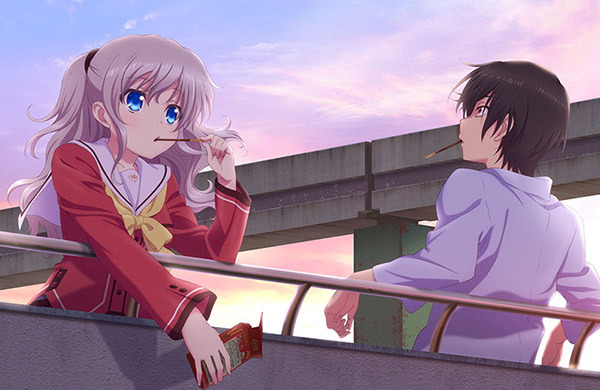Charlotte
November 9, 2019 · 0 comments
By Andy Hanley.
 Charlotte is not a person. Charlotte is a comet that swings close to the Earth once every 75 years, seeding the local orbit with dust particles that can change the biology of pre-adolescent children. Some of them develop paranormal abilities, although how they use them differs widely.
Charlotte is not a person. Charlotte is a comet that swings close to the Earth once every 75 years, seeding the local orbit with dust particles that can change the biology of pre-adolescent children. Some of them develop paranormal abilities, although how they use them differs widely.
Be honest: if you found yourself imbued with super-powers of some description, would you really dash off to buy a spandex outfit and spend your nights engaged in heroic acts to save your fellow citizens from whatever perils befall them? Or would you leverage your new ability to make your own life easier, living a charmed existence where you can ace exams, chase your love interest and live like a king. It’s a question that has troubled many a comics writer from the Golden Age onwards, finding its latest answers in the post-modern storylines of Unbreakable, Heroes, and the modern boom in X-Men, Avengers, and other such icons. Naturally, Japan has an answer of its own.
Although we all like to think that we’d use our powers for good, there’s a good chance that many of us would take the easy option. This is certainly the case with Charlotte‘s protagonist, Yuu Otosaka – as one of a mere handful of humans that has manifested a special ability during puberty, he finds himself capable of physically taking over the body of anyone within his sight. Sure, this only lasts for a few seconds and causes him to effectively pass out in his actual body for the duration, but this narcissistic young man has quickly figured out how to use this ability to his advantage to become top dog at his school through anything but fair means.
 However, Yuu is about to get his come-uppance, and the life he’s built for himself crashes down around his ears in spectacular fashion. This is no accident, for he’s attracted the attention of Nao Tomori, the spirited head of a group of students with special powers of their own that make up the student council of Hoshinoumi Academy, an establishment which provides protection to those with super-powers from anyone who might exploit it.
However, Yuu is about to get his come-uppance, and the life he’s built for himself crashes down around his ears in spectacular fashion. This is no accident, for he’s attracted the attention of Nao Tomori, the spirited head of a group of students with special powers of their own that make up the student council of Hoshinoumi Academy, an establishment which provides protection to those with super-powers from anyone who might exploit it.
It’s difficult to talk about Charlotte beyond these broad strokes, partly to avoid spoiling the far-reaching story that spreads from this basic narrative and partly because the series jam-packs so many facets into that story that it’s hard to know where to start. Writing about the manga incarnation in NEO magazine, Jonathan Clements called it a “remarkably gentle meditation on super-heroics, a junior Heroes if you will,” but also observed that “it doesn’t take a rocket scientist to see how artfully Charlotte allegorises the experience of puberty and high-school politics. A bunch of teenagers suddenly start turning into adults who have different abilities, at different speeds. Some shoot ahead, others lag behind; most are unsure about their newfound ‘powers’ and react to them in different ways.”
The sheer number of story beats that Charlotte works with is astounding, and the fact that it’s all packed into just thirteen episodes even more so. As rollercoaster rides go, this is a decidedly break-neck and dizzying one that operates on a level far from the more typical superhero stories you’ll find in anime and elsewhere.
The other important facet to note about Charlotte is its origins, as the latest original anime from the pen of Jun Maeda, co-founder of developer Key and creator of notable visual novels such as Clannad (the successful anime adaptation of which truly brought his name into the limelight for many) as well as the writer of the hugely successful Angel Beats.
Structurally, there are a lot of similarities between Charlotte and Angel Beats in particular – both series swiftly set up their own unique premise and initially play them for laughs in hugely successful fashion, while also finding time to dig into the characters at the forefront of their growing casts and sprinkle some emotional drama over proceedings to flavour them. Just as you could be persuaded to think that fun and frolics are largely the order of the day, so both series take this opportunity to pull the rug out from under you as that cast’s plight ramps up markedly. The shift from bright and breezy to the depths of despair is a rapid one in Charlotte‘s case, and it isn’t afraid to have characters plumb their darkest depths as a core facet of its tale of love and redemption – even if you’re well-versed in Jun Maeda’s story-telling and consider yourself hardened to his wiles, you’d be hard-pressed not to react to the gut punches the show delivers with regularity.
If you’re able to peer through the sea of tears, then Charlotte is a beautiful show as one might expect from production studio P.A. Works. Character designs are distinctive and serve the story in good stead, and the rest of its presentation is more than capable of keeping up with the various threads which the narrative weaves. The scene for all of this is set marvellously by the show’s gorgeous opening credits, accompanied by a theme sung by regular Jun Maeda collaborator Lia and penned by Maeda himself.
It’s a well-worn cliché to say that something will make you laugh and cry in equal measure, but in Charlotte‘s case it’s a fitting description for a series that is very forthright about its desires to ensure you do both, and Jun Maeda’s experience in that field ensures that it executes on many of the myriad elements it promises to deliver.
Charlotte is released on UK Blu-ray by Anime Limited and is now streaming on All4.
Leave a Reply